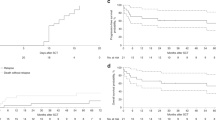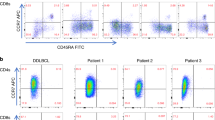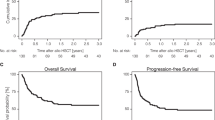Abstract
Post-transplant lymphoproliferative disorder (PTLD) is a leading cause of cancer death in solid organ transplant recipients (SOTRs). Relapsed or refractory (R/R) PTLD portends a high risk of death and effective management is not well established. CD19-targeted CAR-T cell therapy has been utilized, but the risks and benefits are unknown. We report the first case of diffuse large B-cell lymphoma (DLBCL) PTLD treated with lisocabtagene maraleucel and present a systematic literature review of SOTRs with PTLD treated with CD19 CAR-T therapy. Our patient achieved a complete response (CR) with limited toxicity but experienced a CD19+ relapse 8 months after infusion despite CAR-T persistence. Literature review revealed 14 DLBCL and 2 Burkitt lymphoma PTLD cases treated with CD19 CAR-T cells. Kidney (n = 12), liver (n = 2), heart (n = 2), and pancreas after kidney (n = 1) transplant recipients were analyzed. The objective response rate (ORR) was 82.4% (14/17), with 58.5% (10/17) CRs and a 6.5-month median duration of response. Among kidney transplant recipients, the ORR was 91.7% (11/12). Allograft rejection occurred in 23.5% (4/17). No graft failure occurred. Our analysis suggests that CD19 CAR-T therapy offers short-term effectiveness and manageable toxicity in SOTRs with R/R PTLD. Further investigation through larger datasets and prospective study is needed.
This is a preview of subscription content, access via your institution
Access options
Subscribe to this journal
Receive 12 print issues and online access
$259.00 per year
only $21.58 per issue
Buy this article
- Purchase on Springer Link
- Instant access to full article PDF
Prices may be subject to local taxes which are calculated during checkout


Similar content being viewed by others
Data availability
The datasets generated during and/or analyzed during the current study are available from the corresponding author on reasonable request.
References
DeStefano CB, Desai SH, Shenoy AG, Catlett JP. Management of post-transplant lymphoproliferative disorders. Br J Haematol. 2018;182:330–43.
Howard RJ, Patton PR, Reed AI, Hemming AW, Van der Werf WJ, Pfaff WW, et al. The changing causes of graft loss and death after kidney transplantation. Transplantation. 2002;73:1923–8.
Acuna SA, Fernandes KA, Daly C, Hicks LK, Sutradhar R, Kim SJ, et al. Cancer mortality among recipients of solid-organ transplantation in Ontario, Canada. JAMA Oncol. 2016;2:463–9.
Trappe R, Oertel S, Leblond V, Mollee P, Sender M, Reinke P, et al. Sequential treatment with rituximab followed by CHOP chemotherapy in adult B-cell post-transplant lymphoproliferative disorder (PTLD): the prospective international multicentre phase 2 PTLD-1 trial. Lancet Oncol. 2012;13:196–206.
Opelz G, Dohler B. Lymphomas after solid organ transplantation: a collaborative transplant study report. Am J Transplant. 2004;4:222–30.
Lentine KL, Smith JM, Hart A, Miller J, Skeans MA, Larkin L, et al. OPTN/SRTR 2020 annual data report: kidney. Am J Transplant. 2022;22:21–136.
Luskin MR, Heil DS, Tan KS, Choi S, Stadtmauer EA, Schuster SJ, et al. The impact of EBV status on characteristics and outcomes of posttransplantation lymphoproliferative disorder. Am J Transplant. 2015;15:2665–73.
Choquet S, Oertel S, LeBlond V, Riess H, Varoqueaux N, Dorken B, et al. Rituximab in the management of post-transplantation lymphoproliferative disorder after solid organ transplantation: proceed with caution. Ann Hematol. 2007;86:599–607.
Choquet S, Trappe R, Leblond V, Jager U, Davi F, Oertel S. CHOP-21 for the treatment of post-transplant lymphoproliferative disorders (PTLD) following solid organ transplantation. Haematologica. 2007;92:273–4.
Zimmermann H, Koenecke C, Dreyling MH, Pott C, Duhrsen U, Hahn D, et al. Modified risk-stratified sequential treatment (subcutaneous rituximab with or without chemotherapy) in B-cell Post-transplant lymphoproliferative disorder (PTLD) after Solid organ transplantation (SOT): the prospective multicentre phase II PTLD-2 trial. Leukemia. 2022;36:2468–78.
Komrokji RS, Oliva JL, Zand M, Felgar R, Abboud CN. Mini-BEAM and autologous hematopoietic stem-cell transplant for treatment of post-transplant lymphoproliferative disorders. Am J Hematol. 2005;79:211–5.
Malhotra B, Rahal AK, Farhoud H, Moore DF Jr, Kallail KJ. Treatment of recurrent posttransplant lymphoproliferative disorder with autologous blood stem cell transplant. Case Rep Transplant. 2015;2015:801082.
Locke FL, Ghobadi A, Jacobson CA, Miklos DB, Lekakis LJ, Oluwole OO, et al. Long-term safety and activity of axicabtagene ciloleucel in refractory large B-cell lymphoma (ZUMA-1): a single-arm, multicentre, phase 1-2 trial. Lancet Oncol. 2019;20:31–42.
Lee DW, Santomasso BD, Locke FL, Ghobadi A, Turtle CJ, Brudno JN, et al. ASTCT consensus grading for cytokine release syndrome and neurologic toxicity associated with immune effector cells. Biol Blood Marrow Transplant. 2019;25:625–38.
Gauthier J, Hirayama AV, Purushe J, Hay KA, Lymp J, Li DH, et al. Feasibility and efficacy of CD19-targeted CAR T cells with concurrent ibrutinib for CLL after ibrutinib failure. Blood. 2020;135:1650–60.
Page MJ, McKenzie JE, Bossuyt PM, Boutron I, Hoffmann TC, Mulrow CD, et al. The PRISMA 2020 statement: an updated guideline for reporting systematic reviews. BMJ. 2021;372:n71.
de Nattes T, Camus V, Francois A, Dallet G, Ferrand C, Guerrot D, et al. Kidney transplant T cell-mediated rejection occurring after anti-CD19 CAR T-cell therapy for refractory aggressive Burkitt-like lymphoma with 11q aberration: a case report. Am J Kidney Dis. 2022;79:760–64.
Feng G, Li Q, Zhu H, Jiang Y, Yuan J, Fu Y, et al. Safety and efficacy of anti-CD19-chimeric antigen receptor T cell combined with programmed cell death 1 inhibitor therapy in a patient with refractory post-transplant lymphoproliferative disease: case report and literature review. Front Oncol. 2021;11:726134.
Hernani R, Sancho A, Amat P, Hernandez-Boluda JC, Perez A, Pinana JL, et al. CAR-T therapy in solid transplant recipients with post-transplant lymphoproliferative disease: case report and literature review. Curr Res Transl Med. 2021;69:103304.
Krishnamoorthy S, Ghobadi A, Santos RD, Schilling JD, Malone AF, Murad H, et al. CAR-T therapy in solid organ transplant recipients with treatment refractory posttransplant lymphoproliferative disorder. Am J Transplant. 2021;21:809–14.
Luttwak E, Hagin D, Perry C, Wolach O, Itchaki G, Amit O, et al. Anti-CD19 CAR-T therapy for EBV-negative posttransplantation lymphoproliferative disease-a single center case series. Bone Marrow Transplant. 2021;56:1031–7.
Mamlouk O, Nair R, Iyer SP, Edwards A, Neelapu SS, Steiner RE, et al. Safety of CAR T-cell therapy in kidney transplant recipients. Blood. 2021;137:2558–62.
Melilli E, Mussetti A, Linares GS, Ruella M, La Salette C, Savchenko A, et al. Acute kidney injury following chimeric antigen receptor T-cell therapy for B-cell lymphoma in a kidney transplant recipient. Kidney Med. 2021;3:665–8.
Rosler W, Bink A, Bissig M, Imbach L, Marques Maggio E, Manz MG, et al. CAR T-cell infusion following checkpoint inhibition can induce remission in chemorefractory post-transplant lymphoproliferative disorder of the CNS. Hemasphere. 2022;6:e733.
Wang T, Feng M, Luo C, Wan X, Pan C, Tang J, et al. Successful treatment of pediatric refractory Burkitt lymphoma PTLD after liver transplantation using anti-CD19 chimeric antigen receptor T-cell therapy. Cell Transplant. 2021;30:963689721996649.
Dang BN, Ch’ng J, Russell M, Cheng JC, Moore TB, Alejos JC. Treatment of post-transplant lymphoproliferative disorder (PTLD) in a heart transplant recipient with chimeric antigen receptor T-cell therapy. Pediatr Transplant. 2021;25:e13861.
Strati P, Ahmed S, Furqan F, Fayad LE, Lee HJ, Iyer SP, et al. Prognostic impact of corticosteroids on efficacy of chimeric antigen receptor T-cell therapy in large B-cell lymphoma. Blood 2021;137:3272–6.
Portuguese AJ, Tykodi SS, Blosser CD, Gooley TA, Thompson JA, Hall ET. Immune checkpoint inhibitor use in solid organ transplant recipients: a systematic review. J Natl Compr Canc Netw. 2022;20:406–416. e411
Acknowledgements
This work was supported by an institutional training grant from the National Heart, Lung, and Blood Institute (T32 HL007093). We thank Drs. Alberto Mussetti and Edoardo Melilli (Catalan Institute of Oncology) for providing additional information pertaining to their case report.
Author information
Authors and Affiliations
Contributions
AP and CB performed the literature review. AP acquired data, analyzed and interpreted data and drafted the manuscript. ST, JG, EH, and CB revised the manuscript critically for important intellectual content. AH and CY performed research sample testing and edited the manuscript. CB conceived the study, analyzed and interpreted data, and provided critical oversight.
Corresponding author
Ethics declarations
Competing interests
AP has disclosed receiving support from an institutional training grant from the National Heart, Lung, and Blood Institute (T32 HL007093). JG has disclosed receiving research funding from Sobi, Juno Therapeutics, and Celgene; receiving consulting fees from Eusapharma, JMP, Larvol, and Multerra Bio; and serving on advisory boards for Legend Biotech and Janssen. ST has disclosed receiving grant/research support from AVEO Oncology, Bristol-Myers Squibb, Merck & Co., Genentech, Pfizer, Nektar Therapeutics, Exelixis, and Jounce Therapeutics; receiving consulting fees from PLS Group Services, Exelixis, Merck & Co., Bristol-Myers Squibb, and Intellisphere LLC; serving on an advisory board for Merck & Co., Exelixis, and Bristol-Myers Squibb; receiving honoraria from Natera and General Dynamics Information Technology; and serving as a consultant for Targeted Oncology. CB has disclosed serving as a consultant for Natera and Sandoz, and participating in research funded by Natera. EH has disclosed serving as a principal investigator for Neoleukin Therapeutics, ImCheck Therapeutics, Checkpoint Pharmaceuticals, and Nektar. AH has disclosed receiving research funding from Juno Therapeutics, and NanoString Technologies; receiving honoraria from Bristol-Myers Squibb and Novartis. CY has disclosed receiving grant/research support from Pfizer, Sensei Biotherapeutics, Exicure, Incyte, Signal One, Lonza, OBI; receiving consulting fees from Twinstrands; serving on an advisory board for Merck & Co., and Eli-Lily. The remaining authors have disclosed no financial interests, arrangements, affiliations, or commercial interests with the manufacturers of any products discussed in this article or their competitors.
Additional information
Publisher’s note Springer Nature remains neutral with regard to jurisdictional claims in published maps and institutional affiliations.
Supplementary information
Rights and permissions
Springer Nature or its licensor (e.g. a society or other partner) holds exclusive rights to this article under a publishing agreement with the author(s) or other rightsholder(s); author self-archiving of the accepted manuscript version of this article is solely governed by the terms of such publishing agreement and applicable law.
About this article
Cite this article
Portuguese, A.J., Gauthier, J., Tykodi, S.S. et al. CD19 CAR-T therapy in solid organ transplant recipients: case report and systematic review. Bone Marrow Transplant 58, 353–359 (2023). https://doi.org/10.1038/s41409-022-01907-z
Received:
Revised:
Accepted:
Published:
Issue Date:
DOI: https://doi.org/10.1038/s41409-022-01907-z



